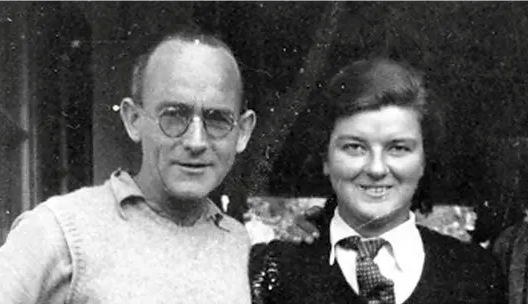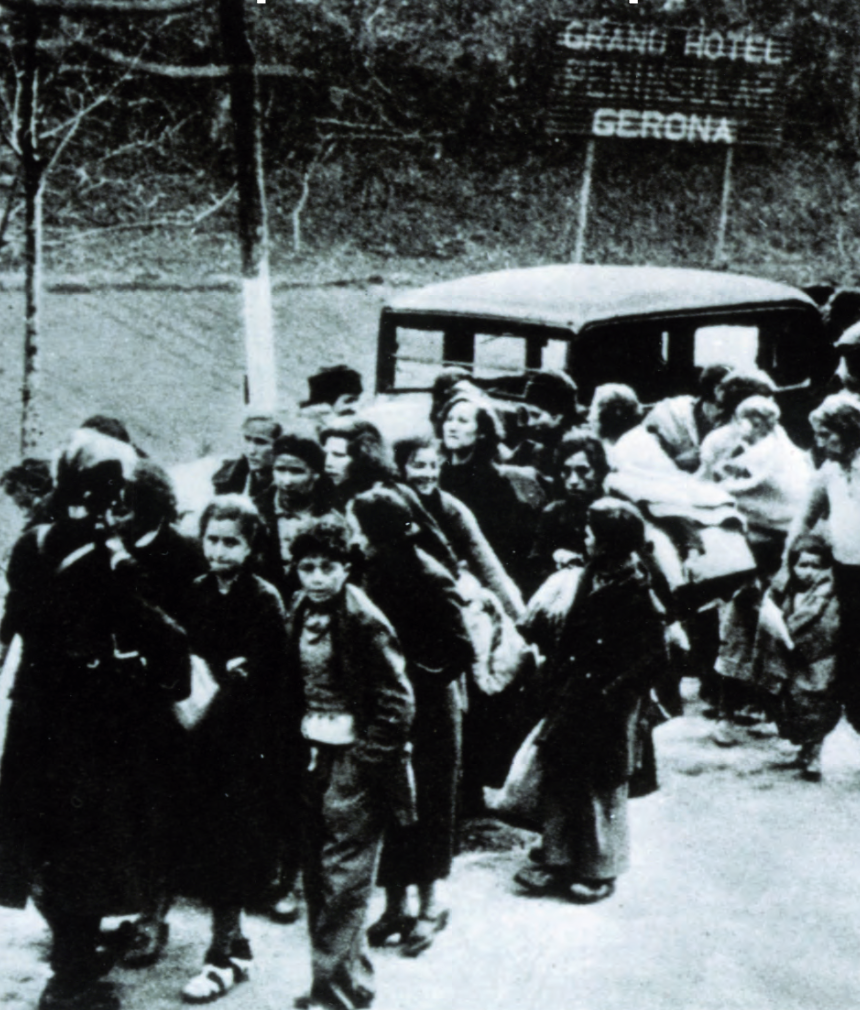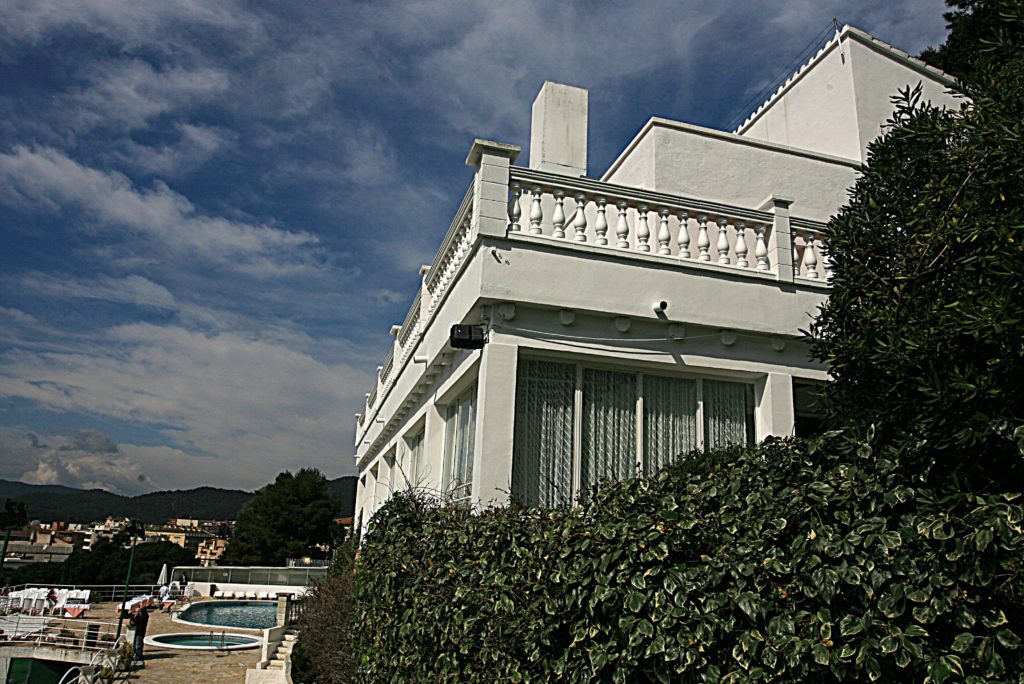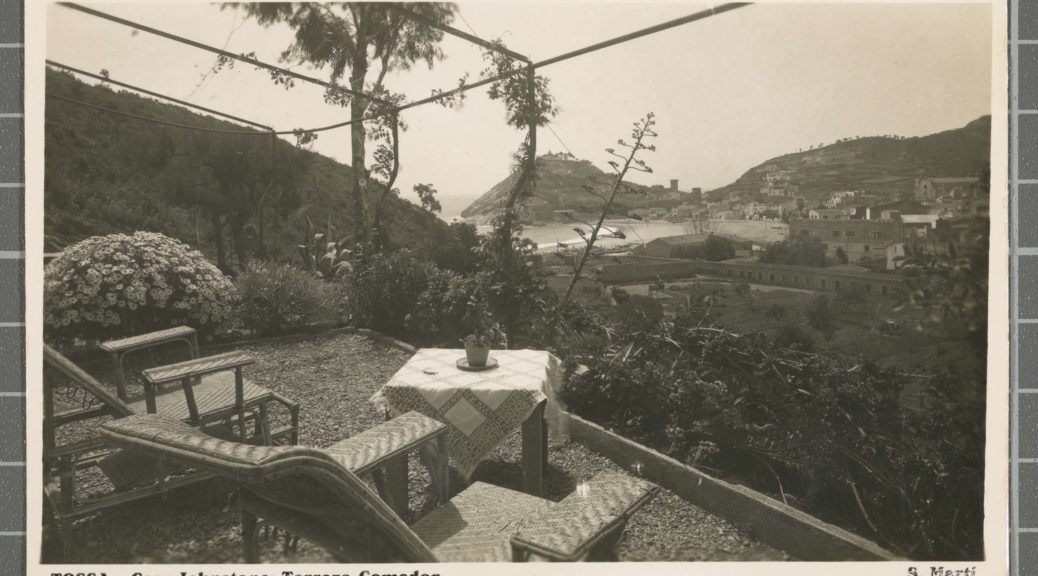In 1935 a British couple Nancy and Archie Johnstone opened a hotel on the Catalan coast in Tossa de Mar. Unlike most foreign residents, the Johnstones stayed on after the Civil War broke out, finally leaving in early February 1939 as Republican resistance to Franco’s forces collapsed in Catalonia. Nancy recounted her experiences in two books published at the time in English: Hotel in Spain (July 1937) and Hotel in Flight (September 1939). Until recently these books were forgotten but in 2011 a Spanish edition of both volumes together was published under the title Un Hotel en la Costa Brava: Tossa de Mar 1934-1939. (Ed. Tusquets, translated by Jaime Salmerón, edited by Miquel Berga i Bagué). A Catalan translation, Un Hotel a la costa: Tossa de Mar 1934-1939 (Ed. Tusquets, translated by Miquel Berga i Bagué) followed shortly after. In 2018 the Catalan director Isona Passola announced plans to make a film based on the Johnstones’ experiences in Tossa de Mar, although those plans did not seem to progress. We are publishing this review to mark the publication of a new English-language edition of Nancy Johnstone’s books, Hotel in Spain and Hotel in Flight , the first since they were originally published.
Nancy and Archie Johnstone first visited the Costa Brava in 1934 and their hotel – known as Casa Johnstone – opened the following summer. Before leaving London Archie worked as a sub-editor on the News Chronicle, a liberal British newspaper, and the couple used their wide connections in England to publicise their hotel among the British middle classes.
In the 1930s Tossa de Mar was very different from the popular tourist resort it became during the 1960s. The population was largely self-sufficient, relying heavily on fishing and growing fruit and vegetables. A number of artists lived in the village, notably the avant-garde German painter Oskar Zugell, who became a close friend of the Johnstones. There was also a small community of refugees from Nazi Germany, who Johnstone regarded as being ill-suited to country life and unable to make friends in the village.
Hotel in Spain is a humorous and gossipy account of the building of the hotel and of their first year as hoteliers. Much of the narrative focuses on the perceived eccentricities of their guests and she provides a sympathetic and affectionate account of the Catalan workers who built the hotel and of the staff who helped to run it. Most of the guests are not identified, apart from the numerous journalists who seem to have been enthusiastic and boisterous visitors. They included Frank Jellinek and his wife, Marguerite; later, when the Civil War broke out the Jellineks were living in Spain, though not in Tossa, and Frank would become the Manchester Guardian’s chief correspondent in Spain during the first months of the conflict. Most of the other journalists were from the News Chronicle which would provide some of the best-informed reporting on Republican Spain during the Civil War by any British newspaper.

According to Johnstone’s account, the political developments during 1935-36 had very little resonance in Tossa, although perhaps her view may be partly a result of the effort required to start the hotel and cater for their guests. In the early weeks of the war they seem to have continued to receive guests but foreign visitors soon stopped arriving, frightened off by the British press, most of which published exaggerated stories of “red violence” in the streets of Barcelona, often with the connivance of supporters of the military rebels. On three occasions a vessel from the British navy visited Tossa to evacuate British citizens, but the Johnstones refused to leave, arguing that they were in no danger from the local population who were their friends and neighbours. The German refugees in Tossa were understandably much more worried about developments, although Johnstone does not seem to have fully appreciated the difference in their situation: already exiles, their fate in the event of a Francoist victory could hardly be compared with those of the two British hoteliers who possessed British passports and who could return to Britain whenever they wanted. In the event most of the refugees in Tossa left the country, though some volunteered to help the Republican war effort.
Hotel in Spain ends with the author describing life in Tossa in the early winter of 1936, by which time the Johnstones had adapted to life without hotel guests. She reports that the village had avoided violence and was being run by a committee of representatives of trade unions and political parties. Supplies of essential foodstuffs seem to have been adequate as most families could rely on their own produce and on exchange with friends and neighbours. This was in stark contrast with the situation in Barcelona and the other industrial areas of Catalonia where food-supply problems produced hyper-inflation, food-queues and social protest in early 1937. The winter of 1937-38 was, however, a different matter in the village: even here there was widespread hardship and, despite being able to barter with friends in the village, the Johnstones were forced to rely partly on food-parcels sent from France and Britain.
Hotel in Flight can be seen as consisting of two parts: the first, dealing with the author’s experiences from January 1937 to May 1938 when the couple returned to Britain for a short period, and the second from August 1938 to early 1939 when the Casa Johnstone was converted into a children’s home. During 1937 most visitors to the hotel were foreigners resting from their efforts in support of the Republican cause, particularly in Barcelona but also at the front. There were also visits from foreign writers and poets such as W. H. Auden. Relations with the Republican government and with the Catalan Generalitat were clearly very good and both governments used the hotel as a venue for lunches for delegations of visiting foreign dignitaries en route to the French frontier.
Although Johnstone spent most of the war in Tossa and seems to have only visited Barcelona on rare occasions, she managed to be in the city on three notable occasions: during the street-fighting in early May 1937 which was made famous in George Orwell’s Homage to Catalonia; during the sustained Italian bombing of Barcelona from 16th to 18th March 1938; and in the final days before the city fell to Franco’s rebel forces in January 1939.
During one of the Italian air-raids in March 1938 she was caught in a small restaurant near the Plaça Urquinaona with Leon, a young German who worked in the Casa Johnstone:
I found myself lying flat on my back somewhere up against the bar. Leon was coughing nearby. The air was thick with fine dust and a choking smell was making every one gasp. I was certain we were being gassed.
There was an odd silence except for the coughing of various people lying on the floor. People began getting up and walking about. Someone picked up a table and put it straight. Leon was busily talking to me, but I was not interested. He says he was only asking me if I was hurt, but it sounded as if he was reading extracts from Thomas Mann… Leon insisted on going out to see if the raid was over. He came back and reported with triumph that the house next door had disappeared. It looked as if a giant knife had cut a slice out of the row of buildings.
Hotel in Flight (pp. 138-9)
Shortly after this experience the Johnstones spent three months in London, trying, apparently in vain, to interest their English friends in the situation in Spain and attempting to counter their friends’ false assumptions: that the Republic was dominated by the Soviet Union, that their hotel had been expropriated by Communists and that they had been expelled. On their return to Tossa in August 1938 they converted the hotel into a children’s home (colonia) supported by the International Solidarity Fund, an organisation established by the international labour movement to support Spanish civilians. The home mainly housed children whose parents were living as refugees in Barcelona after leaving the war-zones of Aragon. By then there were three other colonias in Tossa. This part of her book illustrates the scale of the refugee problem faced by the Republic, especially in Barcelona: as early as January 1937 the Quakers had estimated that there were 25,000 children wandering the city’s streets and by the end of 1938, the city probably housed some 400,000 refugees who had fled Franco’s forces and the war-zones.
After the fall of Barcelona the Johnstones waited with the children in Tossa, unsure whether the International Solidarity Fund would provide transport to take them and the children to France or whether they would all be left in the path of the advancing Francoist forces. Finally escaping in a lorry to Figueras, they all sheltered for several days in the theatre, before Richard Rees, a prominent Quaker worker, arranged their escape to France where the children were initially housed in camps.

Instituut Voor Sociale Geschiedenis – Amsterdam)
At this time – late January and the first two weeks of February 1939 – some 450,000 refugees are usually estimated to have fled from Catalonia into France. Johnstone describes their journey to the frontier as “unforgettable”: the road, which shortly before had been blocked by the broken-down and bombed vehicles of some of the refugees, had been cleared:
The scenes of utter desolation were like pictures of the ravages of a flood or earthquake. It looked as if a giant wave had flung up the broken suitcases, the littered clothes, the swirling heaps of paper. Exhausted refugees flung their possessions from them as they trudged to France. Mattresses, bursting obscenely open, spilled out their entrails, overturned lorries lay nakedly revealing their innermost machinery…Nearer the frontier humans were added to the litter. The fires were alight, warming groups of human jetsam. Smoke from thousands upon thousands of tiny fires wreathed the valleys and poured up from the mountain sides
Hotel in Flight (pp. 353-4)
Understandably Hotel in Flight is more serious in style as well as in content than Johnstone’s earlier volume. Nevertheless George Orwell, who reviewed it for the magazine The Adelphi in December 1939, complained that it was “chirpily facetious”. At the same time, however, he praised the account she gave of the final months of the Republic:
The book becomes increasingly a story of food-shortage and tobacco-shortage, air-raids, spy-mania and refugee children, and ends with the terrible retreat into France and the stench and misery of the concentration camps around Perpignan. Much of the atmosphere will be horribly familiar to anyone who was in Spain at any period of the war. The sense of never having quite enough to eat, the muddle, the inefficiency, the inability to understand what is happening, the feeling that everything is fading away into a sort of mist of fear, suspicion, red-tape and obscure political jealousies – it is all there with plenty of crude physical adventure into the bargain.
Peter Davison (ed), Orwell in Spain, 2001 (pp. 331-2)
After leaving Spain Nancy and Archie Johnstone worked for refugee organisations assisting Spanish refugees in France, before leaving for Mexico. The couple later separated and, after two visits to Tossa de Mar in 1947 and 1951, Nancy sold the Casa Johnstone and settled in Guatemala. The hotel-building still exists, though it is now part of the Hotel Don Juan.

Hotel in Spain and Hotel in Flight are both published in English by The Clapton Press.
Mantenemos una base de datos con 1,4 millones de registros de la Guerra Civil y el franquismo. Suscribete a nuestro boletín de noticias aquí y considera la posibilidad de hacer una donación aquí. ¡Gracias!
PHOTO: Casa Johnstone. Terrace dining room (1930-1940). Ajuntament de Girona. CRDI (Sebastià Martí) – BY-NC-ND.
